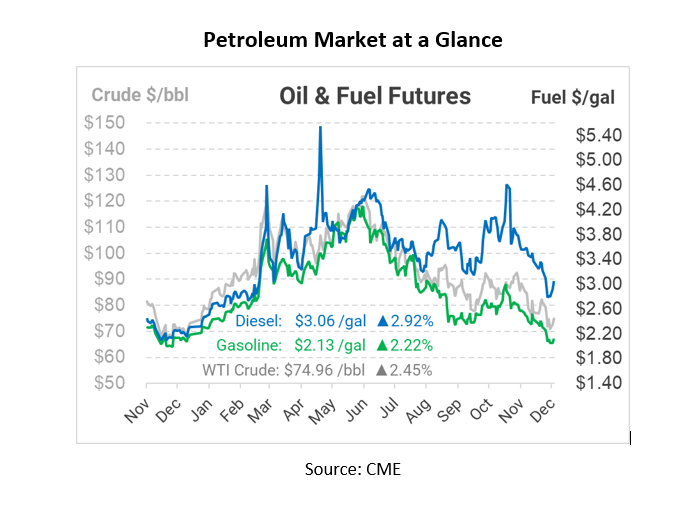
Price Risk Management Checklist: 4 Steps to Budget Certainty
Fuel procurement is a convoluted process that requires careful examination and analysis. Volatility is just one more challenge – it can throw a wrench in your hard-planned budget. Why let the market dictate your financials?
It is impossible to predict unforeseen circumstances such as inclement weather, pipeline disruptions, or refinery shutdowns, all of which can affect your bottom line. Sometimes, it is best to enter a fixed fuel price contract where you can lock in a price for a designated amount of time. This approach ensures no blown budgets, so you can be confident you’ll hit your numbers.
With so many factors affecting the price you pay for fuel, it’s important to consider the data before deciding how to manage your risk, especially in a volatile market. So let’s dive deeper into the four checkpoints you should consider when evaluating price risk.
What is Price Risk Management?
Risk management is the process of identifying, analyzing, and mitigating uncertainty in your fuel pricing. Before entering into any fuel price agreement, utilize our risk management checklist to help determine the next step in designing a customized hedge program for your company. The key to success with fuel price management is identifying your specific needs and goals before entering into an agreement.
- Ratability
The first thing to acknowledge when considering risk management is the volume, or ratability, of your fuel procurement. “Ratable” volume is consistent – perhaps a load of fuel each week, or you may buy a consistent 350,000 gallons each month. Knowing if your volume is predictable or if it fluctuates monthly or seasonally will be helpful in determining your ratability. If your volumes are predictable, then you may benefit from a fixed-price contract. If your volumes fluctuate, it may be wiser to set up shorter-term arrangements or take advantage of term pricing, where you’re not required to take all the volume each month.
- Pricing
Pricing can be set at three different levels of risk – local, regional, or national. Some companies manage only their national risk, which can leave them exposed to quarters – and even dollars – of risk at the local level (called “basis” and “netbacks” for regional and local pricing). Regional price risk could involve natural disasters like hurricanes that impact an entire state, while at a national level, you want to take into consideration things like geopolitics and the value of U.S. currency. If you buy fuel locally, make sure your risk management approach matches where you buy.
- Timing
Timing refers to the frequency you should lock in a fixed price. Fixed price contracts can vary between seasonal, annual, or on an as-needed project basis. Timing may also correlate with volume and how frequently your fuel is procured (i.e., weekly, monthly, or term). For example, if you are a school district that needs fuel for the buses during the school year, then you’ll want to lock in a fixed price contract for those months only. Avoid trying to time the market – it’s rare to beat the market. The key is to set a number that works for your budget, and hit that number.
- Volume
The last thing to consider on the price risk management checklist is volume. Volume is the amount of fuel you should lock into an agreement and what percentage of your procurement that lock should be. Always examine whether a commitment of gallons or a buffer for flexibility is a better option for your company. If your volume fluctuates, you may hedge just 30-50% of your volume. If you’re more ratable, you could get away with more protection by hedging 70-80% of your volume. Most companies avoid hedging 100% of their volume, because there is risk that your consumption could fall and you’re obligated to pay for gallons you don’t need.
Summary
Once you have gathered all of the above fuel procurement statistics for your business and gone through the price risk management checklist, you can make an informed decision about whether to enter a fixed price contract or another form of risk management program customized to your specific requirements. Mansfield offers a broad range of options for managing fuel price risk along with a complimentary price protection analysis. Contact one of our experts today to obtain a forecasted look into procurement and recommendations for future spending.
This article is part of Daily Market News & Insights
Tagged: budgeting, Price Risk Management
MARKET CONDITION REPORT - DISCLAIMER
The information contained herein is derived from sources believed to be reliable; however, this information is not guaranteed as to its accuracy or completeness. Furthermore, no responsibility is assumed for use of this material and no express or implied warranties or guarantees are made. This material and any view or comment expressed herein are provided for informational purposes only and should not be construed in any way as an inducement or recommendation to buy or sell products, commodity futures or options contracts.






